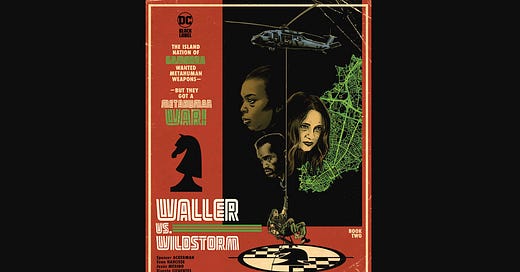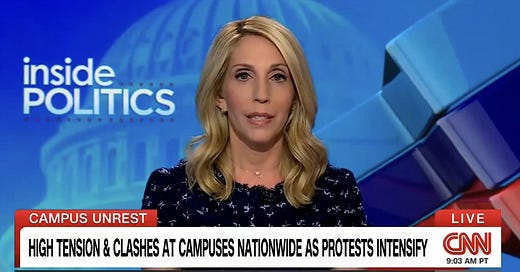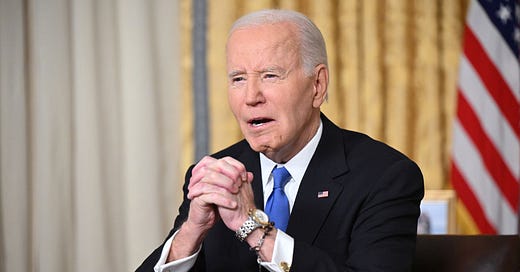
Talking to Spencer Ackerman and Evan Narcisse About WALLER vs WILDSTORM Issue 02
A national security journalist teamed up with one of the sharpest comic book writers of the era and you can probably imagine what happened next.
After spending years covering America’s wars overseas, journalist and friend of the blog Spencer Ackerman has joined veteran comic-book writer Evan Narcisse for a new run of WALLER vs WILDSTORM, a DC Comics imprint that puts a brand new spin on a few of the company’s iconic superheroes. It turns out that spin has some startling parallels to events playing out in the real world today.
For those of you who aren’t DC Comics enthusiasts, here’s a bit of background. WALLER, in this book, is Amanda Waller, a legendary DC character famous for running the Suicide Squad — of Margot Robbie and Jared Leto fame, for the true laymen out there. WILDSTORM refers to a series of heroes that were folded into the DC universe in 2010. The conflict of the series pits Amanda Waller, a morally-gray government operative, against Wildstorm hero Jackson King, aka Battalion, a powerful superhero and leader of a team called Stormwatch. Waller is one of DC’s central figures, often portrayed as the woman who is willing to use any means necessary to accomplish her goals, famously using the powers of supervillains for “good.” In Ackerman and Narcisse’s hands, however, that tendency is placed in a world of imperialism, colonialism, cut-throat capitalism, and corrupt governance, populated by spies, spooks, and superheroes alike.
I was hooked from Issue 01, despite not being much of a comics reader these days, and wanted to talk over some of the main themes of the book with Ackerman and Narcisse after the release of Issue 02, which hit comics stores on Tuesday.
The following interview has been edited for length and clarity.
JACK CROSBIE: Spencer, Evan, thanks so much for doing this! One of the first questions that I had when I read the first issue is: why did you decide to set this sort of new imagining of the Wildstorm universe in the late days of the Cold War, as opposed to doing something that was more current? A lot of Spencer's work focuses on the end of the war on terror, and it seems like there's there would have been fertile opportunities there.
SPENCER ACKERMAN: The mandate for the book was to do a “year one” for Amanda Waller, the kind of Director of National Intelligence of the DC comic book universe. Amanda is introduced in the mid-1980s, right after DC does this massive continuity overhaul called Crisis on Infinite Earths. That's when the Suicide Squad begins. And simultaneously, it was the 30th anniversary of the 1992 launch of Wildstorm [comics], which the setting and so much of the book comes from. So going into the like, late 1980s-ish sort of splits the difference. At that point in time, the end of the U.S.-USSR conflict is the biggest geopolitical event happening in the world.
From a storytelling point of view, setting this story roughly 30 years ago, from our perspective — we know how this story ends up. In 2023, we, in a visceral way, feel the wages of the giant geopolitical and geo-economic gambles that are happening. You get a lot of mileage out of seeing the resonances of what the war on terror will come to take shape as, but we also don’t have the burden of telling a post-9/11 story in addition to [introducing Waller and Wildstorm].
As I read through these issues, I keep seeing these little sorts of references — I’m wondering now how many people are going to read issue two and immediately Google what the Atlácatl Battalion is —
SA: Yes!
It’s such a minute reference. But I saw it and was like, hang on — that’s not a DC comics thing. [The Atlácatl Battalion was a US-trained “counter-insurgency” force in the Salvadorian Civil War that was allegedly responsible for many of the conflict’s worst massacres and war crimes.]
SA: That’s a very deliberately constructed dialogue box. And I definitely wanted to do that.
The story that we’re telling takes place within an intelligence agency. And between Amanda Waller and one of our other main characters, Jackson King, it shows two different perspectives of what that intelligence agency is and what its relationship to the broader American military and economic empires are. We’re showing what the agency… after losing the original rationale that intelligence agencies had in the Cold War — what would it look to next? In doing so, it provides also this natural opportunity to constantly point to like, what sort of things does such an agency actually do in global conflicts like the Cold War?
“When Spencer first told me about this book, I was like ‘Yo, it’s Iran-Contra but with superheroes’ — this kind of horse-trading and influence peddling based around people with superpowers. The main text of the story is that this is how America gains influence in the world geopolitically, and in a world where people can shoot lasers out their eyes, they're going to use that as a vector as well.
— Evan Narcisse
In the first issue, a lot of credit to this goes to Evan — we see the kind of Seal Team Six of the Wildstorm universe, [a superhero squad] called Team SEVEN, go to El Salvador, in the first issue, on a hunt for a specific person with superpowers who happens to be eight years old. We get the opportunity to tie into other things that make it specific, like the reference to the Atlácatl Battalion, and hopefully people will read that and kind of get a sense that this is something that might have actually happened.
EVAN NARCISSE: It's funny — going back to your first question [about] the idea of American imperialism. When I first started talking about this project with Spencer, we both talked about how the superhero idea is a form of cultural imperialism and has been since the 1940s. You look at characters like Superman and Captain America, they're symbols of American idealism. I think by the time you hit the 1980s, within the cohort of people making comics, and the larger mainstream consumer society, there’s a loss of innocence for a lot of people politically. When Spencer first told me about this book, I was like “Yo, it’s Iran-Contra but with superheroes” — this kind of horse-trading and influence peddling based around people with superpowers. It’s not an entirely new idea in comics… [but] this is very direct. There’s nothing really sly about it. The main text of the story is that this is how America gains influence in the world geopolitically, and in a world where people can shoot lasers out their eyes, they're going to use that as a vector as well.
JC: In issue two it really becomes clear that the only thing really different about this book and real life is that instead of promising these developing nations Lockheed Martin missiles and F-16s, Amanda Waller is just saying, I can give your despot’s kid supernatural abilities. What's interesting about this book is that the superhero abilities are almost sort of like these piddly little horse race things that the U.S. is trading around, because the actual power that the U.S. is using is like, financial influence — the powers themselves are subsidiary to the actual powers that be. Was that always the intent, to make a book where superpowers are just another weapon in imperialism’s arsenal?
SA: So there will be specific powers centered as the book goes on, without saying much more. But we establish how meta-human abilities would work as what the United States would call an aspect of national power. There’s military power, there’s economic power, there’s intelligence power, and now there would also be superpower. This is the fun part of writing superhero comics, it literalizes what these power relationships are.
JC: The other thing that struck me is how quickly the bureaucratic guardrails fail in these circumstances. In the beginning, you have Jackson King, Battalion, who is a superhero of enormous power — high tier in the DC universe in terms of capabilities. You immediately put that character as a suit working in the Office of the Inspector General. I thought “Oh, that’s interesting, we’re gonna get a little bit more of the diplomatic side of things. And that lasts all the way up through like, maybe 15 pages into the issue. He has all the documents, he lays it all out in front of Waller, and she says “I don’t care. Seal Team Six is arresting you right now.” And bureaucracy immediately fails. What were you trying to say about the current limits of our own government to police itself?
SA: I’m a national security reporter. I come to stories much more in the vein of Lois [Lane, also a character in this series]. I wanted to kind of use those symbols of institutional safeguards like rapidly breaking down in the face of the kind of world-changing pressure that Amanda’s machinations have in store. We’re stressing extremely hard Jackson’s stable sense of this institution [CHECKMATE, as the intelligence agency is called in the series] that he has served his whole life and which he is still determined to save. We leave issue two with the question of whether Jackson can do all of that.
The story that we presented is one where Amanda starts out in an actual black site in the middle of a proxy war halfway around the world — this is some stuff the CIA actually does, it's stuff that I've covered the CIA doing, and what's always been interesting to me is seeing how within the CIA, there really are Amandas and there really are Jacksons. There isn’t really one stable definition of what this agency is meant to do — what actions constitute heroism and what actions constitute crime. I wanted to use characters that I love to make those differences really vivid.
JC: Evan I wanted to ask you specifically, as an experienced comic book writer, when you were first mapping this out with Spencer, what were you drawing from, what were your inspirations there?
EN: Part of it was just growing up in the 80s. Like, the Iran-Contra hearings were something I watched on TV as a kid. I watched that unfold in real time. I'm a child of Haitian immigrants — we grew up absorbing Black American culture. I grew up hearing about how the Duvaliers, backed by the United States, had random massive deforestation campaigns in Haiti. My mom will talk about the forest and the woodlands she grew up with and how she watched them disappear in real time.
To me, the line of that kind of thinking that Spencer was talking about — where people tell themselves that they're doing the right thing, maybe with some morally compromised means, saying that that doesn’t matter as long as the Machiavellian result happens. As I’ve become a comic book writer, I’ve just wanted to explore that tension in different ways. I’ve tried to explore the idea of American exceptionalism from the perspective of people who have been under the boot.
JC: Yeah, there’s an interaction between Waller and King in issue two, where Waller is repeatedly saying to King, “You were my family’s hero,” that as a Black person growing up, having that Black superhero was a big thing. And she says later on that [her methods] are how we get “one of us” even higher up in the government. She’s taken the image that King projected, but used so much more extreme and morally ambiguous means to get to that point.
EN: We definitely want to set up Battalion [King’s superhero alter-ego], as a character who thinks he's using force the right way — he is a symbol of Checkmate [the spy agency]’s original founding principles as a civil rights organization.
SA: Which is a real thing that happened in the comics in the 1980s.
EN: So [Jackson King] is like, “Yeah, I'm busting heads, but the mandate is this, right." And, you know, Jackson's big failing here is really failing to recognize the political landscape changing around him. Jackson thinks all he needs to do is fly in, hit the right people, and things will be the way they're supposed to be. And [Amanda Waller] is like, “Nah, old man. It's really about pulling the levers on rooms you can't even access and never even see.” Both these characters think they're doing the right thing. Amanda has no illusions that her securing political power is going to be what keeps people from her and Jackson's background safest.
To me, she’s — oof. Man. I don’t think I’ve said this in an interview yet so Spencer don’t hate me —
SA: I can’t wait, I can’t wait, go on —
EN: She’s got that Condoleezza Rice mindset! She’s like “I’m for us!” And meanwhile if you’re me during that political era, I was like, “Mmmm you’re not for us, you don’t speak for me, Condi.”
JC: [Laughing] I was going to try to lead you into that by asking if there were any real-life figures you thought about when writing Waller’s character and Condi was the first person I thought of.
EN: Yeah! The idea that like, OK, it’s different if it’s one of us who’s in charge of these efforts — really doesn’t hold a lot of water. If you’re still doing things that are ethically and morally reprehensible, I don’t care what you look like. The idea that she uses that as a vector of psychological manipulation for Jackson… it’s uh… it’s a thing that happens, is all I’ll say.
JC: Yeah, I mean, as Spencer’s work has shown, the expansion of special forces and reliance on unilateral drone strikes started under the Bush administration but flourished under the Obama administration!
EN: The thing that we're trying to also try to get at in the book is like, once this erosion of like verboten methodologies starts, there's no stopping it. I’m old enough to remember when the Patriot Act passed. I was like, “You’re not putting that genie back in the bottle.”
JC: I know you guys have to go, so I want to close with this. Issue two ends with Jackson leaving behind his Office of the Inspector General suit, which has failed in record time to act as a check on anything, reuniting with members of his old team Stormwatch, and putting his Battalion suit back on. How long is this phase of his resistance going to last?
SA: So issue one we’re going up the roller coaster. By the time we end issue two, we’re going rapidly down. And that’s what issue three is going to be. All of the wagers we’ve set in the first two issues, we’re going to find out how they come due.
EN: The thing about I think the third issue and issues beyond is like, we're really going to find out whether Jackson [King] is playing chess or checkers, and does he see the whole board? And how does he move around it?


















why wasn't this released as a podcast?
I’m a trade paperback boi, so I’ll put this on the future list.